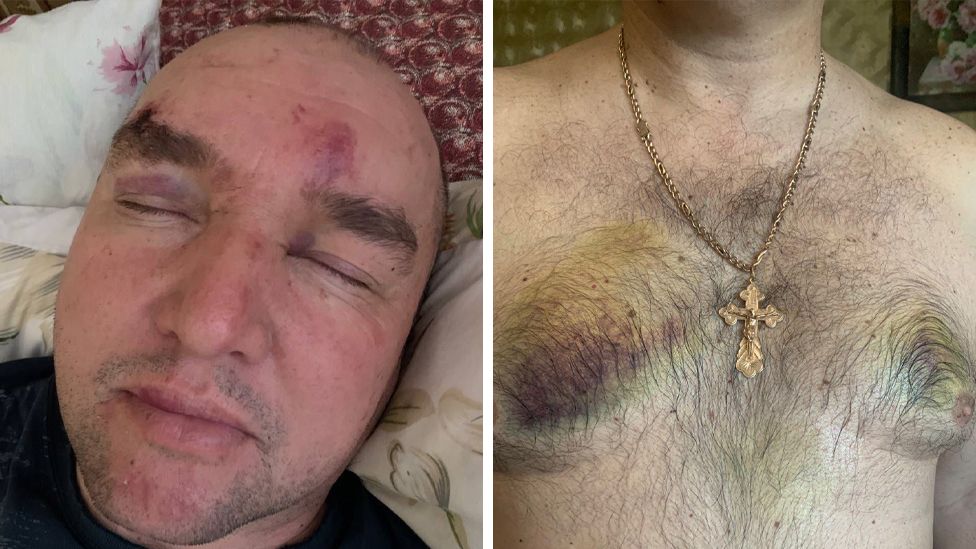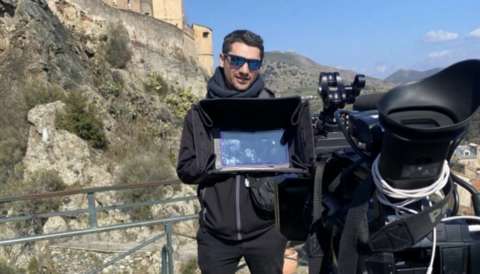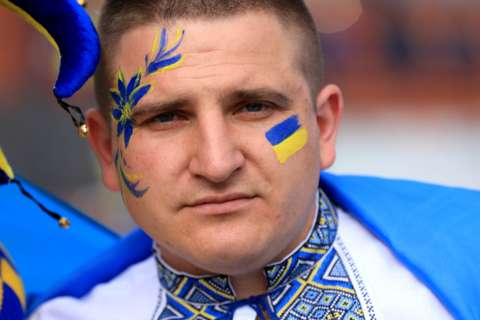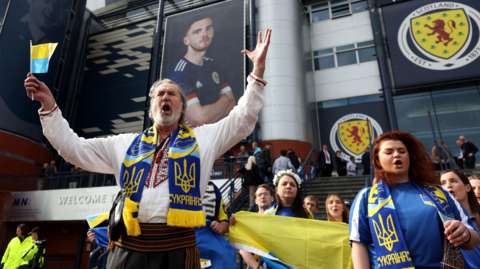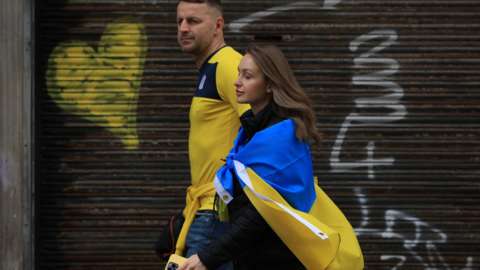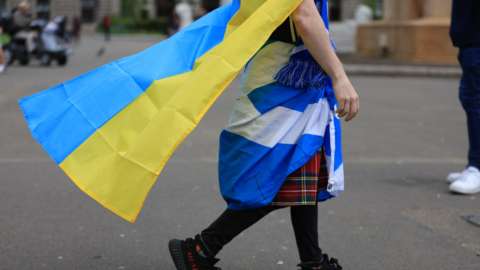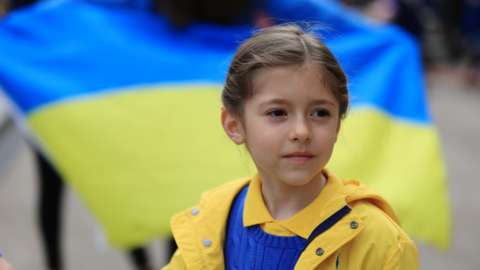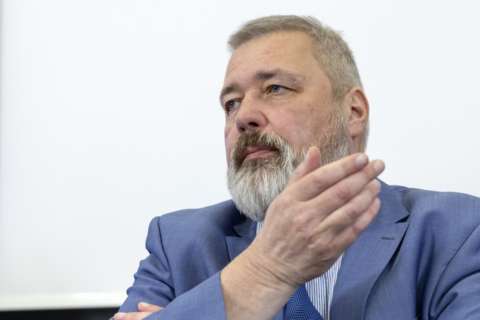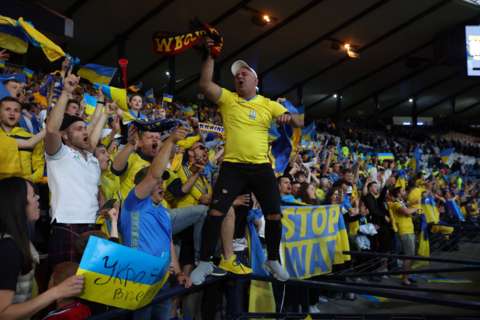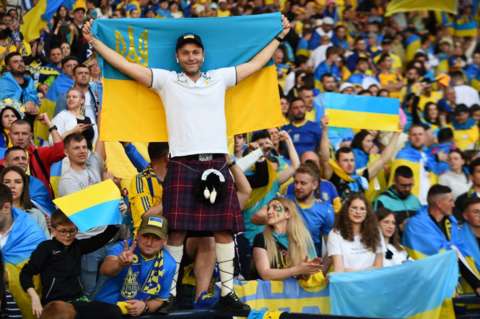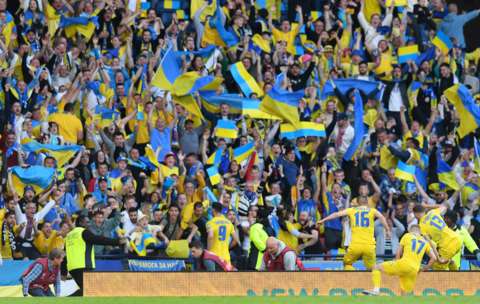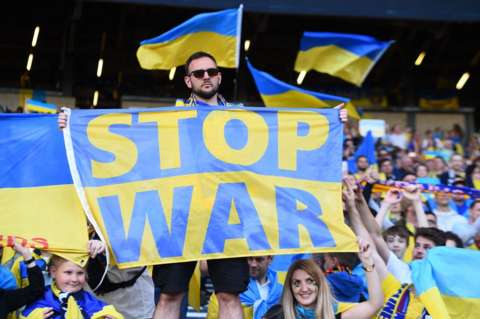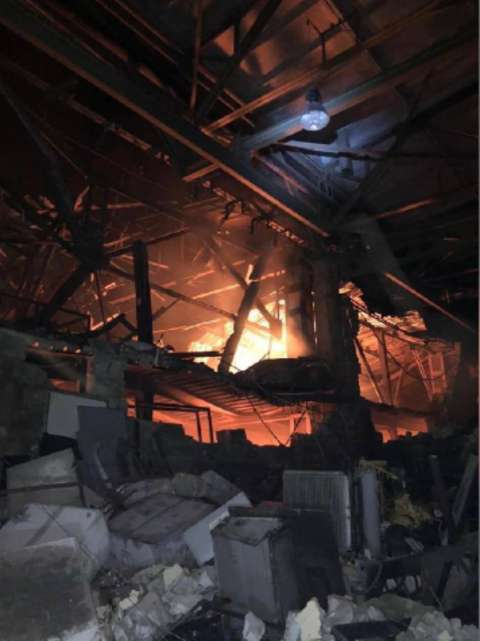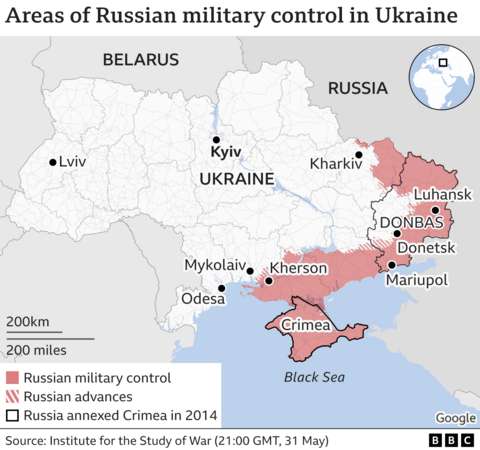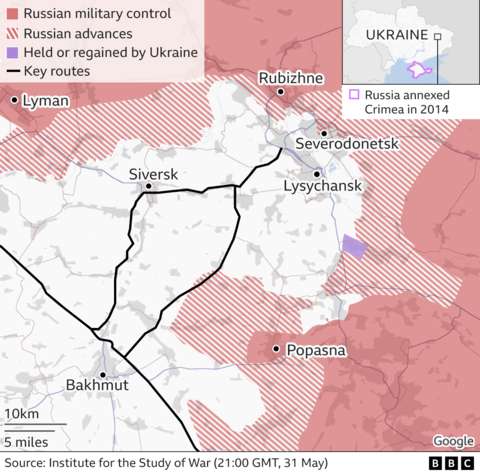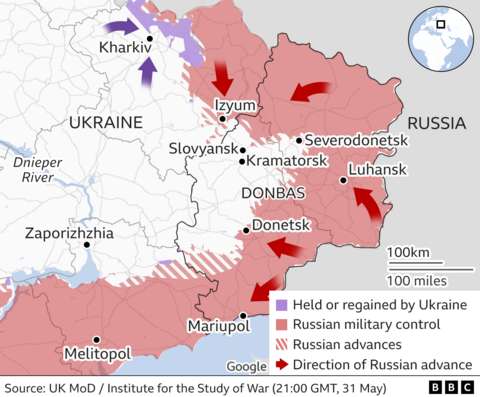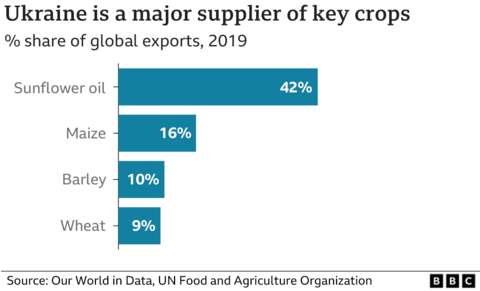'I watched from afar Russia’s latest merciless assault on Severodonetsk'
By Quentin Sommerville
BBC News, Lysychansk, Ukraine
Published18 hours ago
View of Severodonetsk from Lysychansk
IMAGE SOURCE,QUENTIN SOMMERVILLE / BBC
Image caption,From Lysychansk, smoke could be seen rising above Severodonetsk
Russian forces have entered the city of Severodonetsk, as they continue their attempts to capture the eastern Donbas region of Ukraine. One of the region's governors says that the bombardment of the industrial centre is so intense that they have given up counting the casualties.
Just days ago, I watched from a rooftop in Lysychansk as, on the horizon, its twin city of Severodonetsk was being bombed indiscriminately. Shells were landing every minute on its length and breath. Severodonetsk was burning.
Lysychansk itself has been drained of life. A few people still go out on the streets, but they are mostly deserted. Artillery fire is a regular threat. The air carried on the summer breeze is gritty with dust from smoke and pulverised buildings.
Having failed to conquer all of Ukraine, Russian forces are now targeting Donbas - made up of the Donetsk and Luhansk regions. If Severodonetsk and Lysychansk fall, the whole of Luhansk would be occupied.
Here, Russia isn't fighting a campaign of attrition, it's waging a war of oblivion. And, for the moment on this front, it is winning.
Smoke rises from a bombed oil refinery in Lysychansk, 27 May
IMAGE SOURCE,GETTY IMAGES
Image caption, Smoke rises from a bombed oil refinery in Lysychansk, 27 May
Serhiy Haidai, the governor of Luhansk, now says that all critical infrastructure in Severodonetsk has been destroyed. Previously, he suggested that Ukrainian forces may have to withdraw from the city and Lysychansk.
The scene of devastation in a third city, Rubizhne - in peacetime just a short drive to the north - shows what Russia's unrelenting artillery fire is capable of. Looking from Lysychansk into the distance, there is now a blot on the emerald green landscape. The small city is gone - scoured from the earth.
The way it fell some two weeks ago, marks an important shift in how Vladimir Putin's forces are now fighting the war. Gone are long armoured columns and tank and infantry attacks seen in the first months, in favour of large-scale artillery barrages - as many as 1500 shells a day in Rubizhne - to wipe out resistance before any ground advance.
Map of the region around Severodonetsk and the Russian military control area as of 29 May 2022
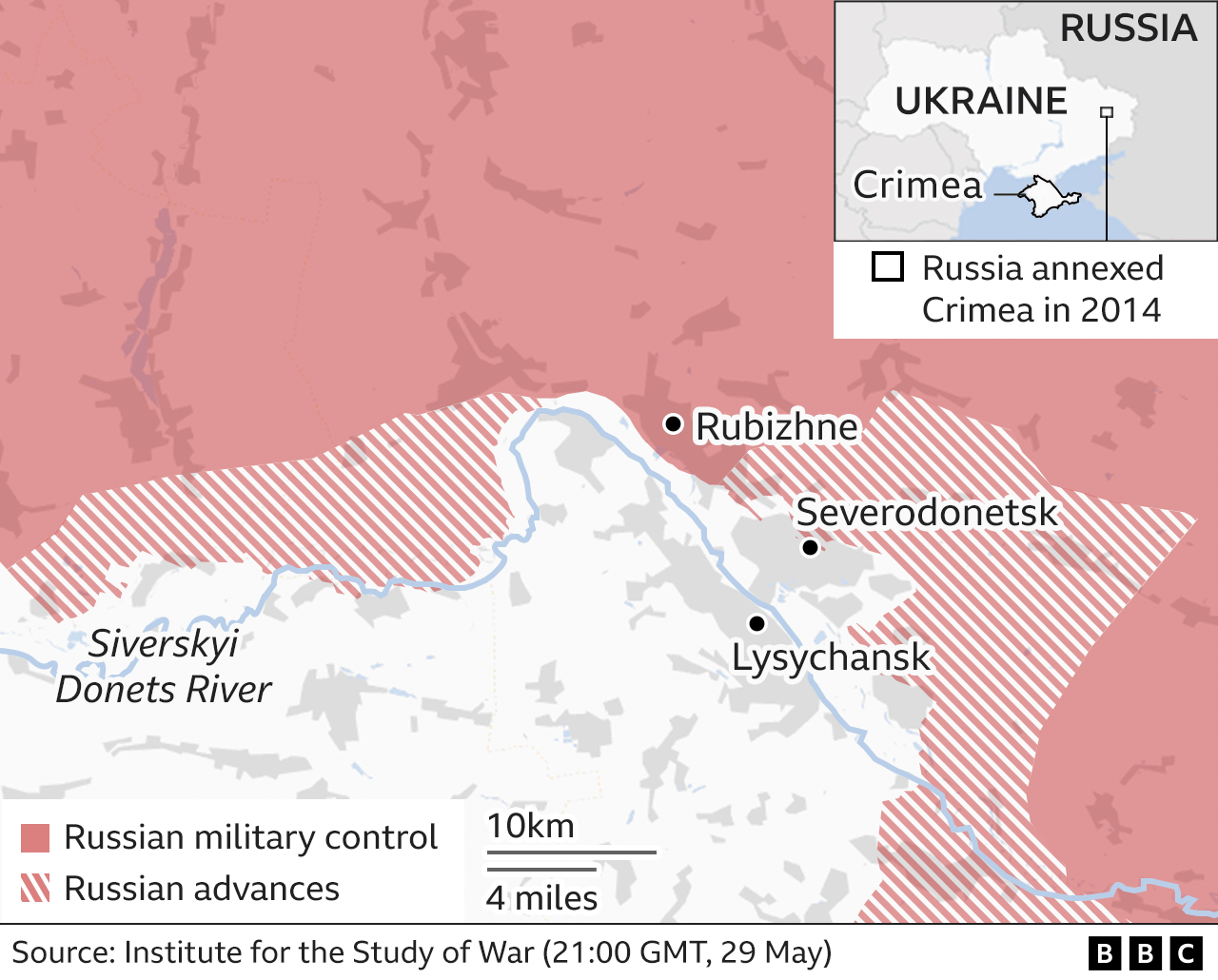
Overwhelming Russian firepower - particularly artillery - underlines the urgent need, say Ukrainian field commanders, for more advanced weapons from the West to halt the enemy advance.
The great sweep of Donbas runs along Ukraine's eastern flank from Severodonetsk in the north, ending at the southern coast around the city of Mariupol - the hard-fought over city recently captured by Russia in one of its biggest gains in the war.
President Volodymyr Zelensky said last week that Ukraine was losing 50-100 troops a day in the region. In Lysychansk, I meet private first class, Vladimir, serving with a reconnaissance unit in the country's National Guard. Russian forces are adapting, he says, first they came in "bold and got hit hard", now the enemy flattens what it can't capture with infantry.
He tells me of his month in Rubizhne. "It wasn't Mariupol, but it was pretty close. It was very hard. There were a lot of losses - a lot of fighting across streets. There was also artillery, just removing those houses very fast. People were trying to hide in the basement so they had no view, no assessment of the current situation. So there were a lot of losses during that time."
The men and women fighting in Donbas for Ukraine are not inexperienced. Many have fought against Russian-backed separatists who, since 2014, have been trying to secede from Ukraine. But, in this new battle for the region, they face a national army - one that has large resources of men and equipment. Even for experienced fighters, the volume and nature of Russian weaponry being used in Donbas is overwhelming.
I speak to another guardsman who doesn't want to give his name. "It's not my first war," he says, "I mean that one was a trench warfare, so it's a bit different [this time]. When I went to Rubizhne I saw the whole picture. It was tough. Shots with high-explosive fragmentation grenades, 82 mm calibre weapons," he says, stopping to draw on a cigarette.
Vladimir - the Ukrainian soldier - says the local population are "30% pro-Ukrainian, 30% pro-Russian and 40% don't care". Of course, many pro-Ukrainian residents have now fled.
Since the start of the war, military analysts have made much of Russia's rising casualty numbers and the weakness of morale among its soldiers. Casualty numbers are still rising, but Russia isn't running out of men in Donbas. Nor is the Kremlin running short of artillery shells. The explosives which are hammering Lysychansk and Severodonetsk seem in plentiful supply. The surrounding countryside too is marked like a pox with black artillery craters spreading for miles along fields and roadways.
"There's a lot of artillery," says Vladimir. "Bombardments are like a nightmare, we shoot one round, they shoot 10. When our sniper is shooting, they send in a full packet of Grads on his position. So it's basically a sniper with one bullet and they send like $1,000 of artillery rounds. They really don't care how much ammunition they use."
Like Vladimir, many of the men I met in Lysychansk were previously the defenders of Rubizhne. Having been through hell once, they say they prepared to endure it a second time.
Media caption, Rubizhne destroyed and Russian soldiers carry the body of a dead comrade - view from a Ukrainian drone
Footage given to the BBC by a unit of the National Guard shows a landscape there which could be a recreation of World War Two devastation - lines of shelled-out houses, empty streets with only corpses and dead animals along the pathways. And there's another reminder too from that war - shellshock. Men left the town with shaking hands and limbs - and constant headaches. "Cigarettes and coffee are all that keep them away," said one young lieutenant called Pasha.
Ukrainian officer Pasha
IMAGE SOURCE,QUENTIN SOMMERVILLE / BBC
On the outskirts of Lysychansk, bigger guns have arrived on the Ukrainian front line. Another unit of the National Guard are working on an M777 howitzer, newly received from the Australian government. It has two kangaroos painted on the barrel.
The gun is welcome but, as almost everyone I meet tells me, they need more. They specifically asked for longer range weapons. The US has agreed to send them far more powerful multiple launch rocket systems. They could be a game-changer in Donbas, if they arrive in time.
M777 howitzer from the Australian government
IMAGE SOURCE,QUENTIN SOMMERVILLE / BBC
Some Western commentators believe Ukraine should submit to end the destruction and cede its territory. But, for the weary Ukrainian defenders facing the Russian onslaught, that is unthinkable. In fact, the losses they have suffered have only galvanised their belief that the enemy must be stopped and pushed back.
Vladimir Putin gambled big - and lost - on taking all of Ukraine, so perhaps that explains the enormous resources he is throwing at achieving a tactical win in Donbas. But a Kremlin victory here won't mean defeat for Ukraine.
I ask the unnamed guardsman, tired after months of battle, but still here at front, what it will take to win?
"There is a sky, and the sky is ours. Drones are helping a lot. Weapons have arrived and multiple rocket launchers. America, lend-lease…" he tells me. "The only question is time. It's time and that's it. And then everything will be Ukraine."
Follow Quentin on Twitter @sommervilletv
By Quentin Sommerville
BBC News, Lysychansk, Ukraine
Published18 hours ago
View of Severodonetsk from Lysychansk
IMAGE SOURCE,QUENTIN SOMMERVILLE / BBC
Image caption,From Lysychansk, smoke could be seen rising above Severodonetsk
Russian forces have entered the city of Severodonetsk, as they continue their attempts to capture the eastern Donbas region of Ukraine. One of the region's governors says that the bombardment of the industrial centre is so intense that they have given up counting the casualties.
Just days ago, I watched from a rooftop in Lysychansk as, on the horizon, its twin city of Severodonetsk was being bombed indiscriminately. Shells were landing every minute on its length and breath. Severodonetsk was burning.
Lysychansk itself has been drained of life. A few people still go out on the streets, but they are mostly deserted. Artillery fire is a regular threat. The air carried on the summer breeze is gritty with dust from smoke and pulverised buildings.
Having failed to conquer all of Ukraine, Russian forces are now targeting Donbas - made up of the Donetsk and Luhansk regions. If Severodonetsk and Lysychansk fall, the whole of Luhansk would be occupied.
Here, Russia isn't fighting a campaign of attrition, it's waging a war of oblivion. And, for the moment on this front, it is winning.
Smoke rises from a bombed oil refinery in Lysychansk, 27 May
IMAGE SOURCE,GETTY IMAGES
Image caption, Smoke rises from a bombed oil refinery in Lysychansk, 27 May
Serhiy Haidai, the governor of Luhansk, now says that all critical infrastructure in Severodonetsk has been destroyed. Previously, he suggested that Ukrainian forces may have to withdraw from the city and Lysychansk.
The scene of devastation in a third city, Rubizhne - in peacetime just a short drive to the north - shows what Russia's unrelenting artillery fire is capable of. Looking from Lysychansk into the distance, there is now a blot on the emerald green landscape. The small city is gone - scoured from the earth.
The way it fell some two weeks ago, marks an important shift in how Vladimir Putin's forces are now fighting the war. Gone are long armoured columns and tank and infantry attacks seen in the first months, in favour of large-scale artillery barrages - as many as 1500 shells a day in Rubizhne - to wipe out resistance before any ground advance.
Map of the region around Severodonetsk and the Russian military control area as of 29 May 2022

Overwhelming Russian firepower - particularly artillery - underlines the urgent need, say Ukrainian field commanders, for more advanced weapons from the West to halt the enemy advance.
The great sweep of Donbas runs along Ukraine's eastern flank from Severodonetsk in the north, ending at the southern coast around the city of Mariupol - the hard-fought over city recently captured by Russia in one of its biggest gains in the war.
President Volodymyr Zelensky said last week that Ukraine was losing 50-100 troops a day in the region. In Lysychansk, I meet private first class, Vladimir, serving with a reconnaissance unit in the country's National Guard. Russian forces are adapting, he says, first they came in "bold and got hit hard", now the enemy flattens what it can't capture with infantry.
He tells me of his month in Rubizhne. "It wasn't Mariupol, but it was pretty close. It was very hard. There were a lot of losses - a lot of fighting across streets. There was also artillery, just removing those houses very fast. People were trying to hide in the basement so they had no view, no assessment of the current situation. So there were a lot of losses during that time."
The men and women fighting in Donbas for Ukraine are not inexperienced. Many have fought against Russian-backed separatists who, since 2014, have been trying to secede from Ukraine. But, in this new battle for the region, they face a national army - one that has large resources of men and equipment. Even for experienced fighters, the volume and nature of Russian weaponry being used in Donbas is overwhelming.
I speak to another guardsman who doesn't want to give his name. "It's not my first war," he says, "I mean that one was a trench warfare, so it's a bit different [this time]. When I went to Rubizhne I saw the whole picture. It was tough. Shots with high-explosive fragmentation grenades, 82 mm calibre weapons," he says, stopping to draw on a cigarette.
Vladimir - the Ukrainian soldier - says the local population are "30% pro-Ukrainian, 30% pro-Russian and 40% don't care". Of course, many pro-Ukrainian residents have now fled.
Since the start of the war, military analysts have made much of Russia's rising casualty numbers and the weakness of morale among its soldiers. Casualty numbers are still rising, but Russia isn't running out of men in Donbas. Nor is the Kremlin running short of artillery shells. The explosives which are hammering Lysychansk and Severodonetsk seem in plentiful supply. The surrounding countryside too is marked like a pox with black artillery craters spreading for miles along fields and roadways.
"There's a lot of artillery," says Vladimir. "Bombardments are like a nightmare, we shoot one round, they shoot 10. When our sniper is shooting, they send in a full packet of Grads on his position. So it's basically a sniper with one bullet and they send like $1,000 of artillery rounds. They really don't care how much ammunition they use."
Like Vladimir, many of the men I met in Lysychansk were previously the defenders of Rubizhne. Having been through hell once, they say they prepared to endure it a second time.
Media caption, Rubizhne destroyed and Russian soldiers carry the body of a dead comrade - view from a Ukrainian drone
Footage given to the BBC by a unit of the National Guard shows a landscape there which could be a recreation of World War Two devastation - lines of shelled-out houses, empty streets with only corpses and dead animals along the pathways. And there's another reminder too from that war - shellshock. Men left the town with shaking hands and limbs - and constant headaches. "Cigarettes and coffee are all that keep them away," said one young lieutenant called Pasha.
Ukrainian officer Pasha
IMAGE SOURCE,QUENTIN SOMMERVILLE / BBC
On the outskirts of Lysychansk, bigger guns have arrived on the Ukrainian front line. Another unit of the National Guard are working on an M777 howitzer, newly received from the Australian government. It has two kangaroos painted on the barrel.
The gun is welcome but, as almost everyone I meet tells me, they need more. They specifically asked for longer range weapons. The US has agreed to send them far more powerful multiple launch rocket systems. They could be a game-changer in Donbas, if they arrive in time.
M777 howitzer from the Australian government
IMAGE SOURCE,QUENTIN SOMMERVILLE / BBC
Some Western commentators believe Ukraine should submit to end the destruction and cede its territory. But, for the weary Ukrainian defenders facing the Russian onslaught, that is unthinkable. In fact, the losses they have suffered have only galvanised their belief that the enemy must be stopped and pushed back.
Vladimir Putin gambled big - and lost - on taking all of Ukraine, so perhaps that explains the enormous resources he is throwing at achieving a tactical win in Donbas. But a Kremlin victory here won't mean defeat for Ukraine.
I ask the unnamed guardsman, tired after months of battle, but still here at front, what it will take to win?
"There is a sky, and the sky is ours. Drones are helping a lot. Weapons have arrived and multiple rocket launchers. America, lend-lease…" he tells me. "The only question is time. It's time and that's it. And then everything will be Ukraine."
Follow Quentin on Twitter @sommervilletv
